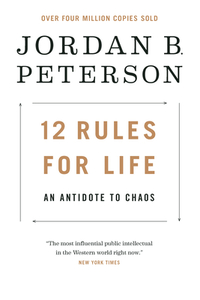Take a photo of a barcode or cover
Peterson’s primary claim (half-truth supposition) is that hierarchical structures are essential because lobsters exhibit a hierarchical structure in response to scarcity and environmental stress.
This presupposes that:
Lobsters are similar enough to humans for this to be relevant, that a particular evolutionary adaption to external stressors is the only reasonable adaption (i.e. establishment of lobster hierarchies over egalitarian formations), and that what is “natural” is inherently good for humans.
Peterson presents these suppositions as proto-societal axioms that by understanding them will change you from a depressed, low serotonin lobster to an aggressive, high serotonin, king of crustaceans.
As far as self-help books go the recommendations are run of the mill. Much like a dominant lobster, stand up straight with your shoulders back, and clean your room. Be confident and work within the hierarchy. Peterson presents this very straightforward information in his normal “Petersonian” way- a self-masturbatory mess of pseudo-scientific, neoliberal pandering word salad. It’s certainly more lucid than Maps of Meaning, which is the only impressive thing about this work, maybe besides the audacity of presenting crustacean hierarchies as a standard for judging human social organizations.
This presupposes that:
Lobsters are similar enough to humans for this to be relevant, that a particular evolutionary adaption to external stressors is the only reasonable adaption (i.e. establishment of lobster hierarchies over egalitarian formations), and that what is “natural” is inherently good for humans.
Peterson presents these suppositions as proto-societal axioms that by understanding them will change you from a depressed, low serotonin lobster to an aggressive, high serotonin, king of crustaceans.
As far as self-help books go the recommendations are run of the mill. Much like a dominant lobster, stand up straight with your shoulders back, and clean your room. Be confident and work within the hierarchy. Peterson presents this very straightforward information in his normal “Petersonian” way- a self-masturbatory mess of pseudo-scientific, neoliberal pandering word salad. It’s certainly more lucid than Maps of Meaning, which is the only impressive thing about this work, maybe besides the audacity of presenting crustacean hierarchies as a standard for judging human social organizations.
challenging
emotional
hopeful
inspiring
reflective
fast-paced
challenging
informative
inspiring
reflective
slow-paced
If you've watched Jordan's Maps of Meaning & Personality playlist on YouTube, then you will find most of this book as a more definite form of those lectures.
Loving it till now.
Loving it till now.
informative
inspiring
reflective
slow-paced
challenging
informative
inspiring
reflective
medium-paced
challenging
emotional
hopeful
informative
inspiring
reflective
tense
slow-paced
challenging
informative
inspiring
reflective
slow-paced
Update: I got the audio book and still couldn't handle it. I made it like 75% through, but I couldn't Force myself to pay attention. Sorry, this just isn't the book for me.
I only made it to page 161 then gave up. I suppose I'll finish it one day on audio book where I can mostly tune out.
I was very excited to read this after having it recommended by multiple friends, but I just can't get on board. The author uses so many words to say so little. If these really are simple (as all truth should be) rules for life, you shouldn't have to bloviate for 15 pages off topic just to prove a small point related in some small way to the rule your trying to teach (see what I did there, I can also go on forever about nothing).
Maybe I just don't get it, maybe I'm not smart enough to get it. But honestly, nothing in this book as far as I read was ground breaking, new or novel. It really just seemed like writing for the purpose of filling empty pages (is that bringing chaos into order?).
But then again, who am I to criticize? I've never written a book and if I did I'm sure nobody other than family or friends would care to read it, let alone buy it.
I only made it to page 161 then gave up. I suppose I'll finish it one day on audio book where I can mostly tune out.
I was very excited to read this after having it recommended by multiple friends, but I just can't get on board. The author uses so many words to say so little. If these really are simple (as all truth should be) rules for life, you shouldn't have to bloviate for 15 pages off topic just to prove a small point related in some small way to the rule your trying to teach (see what I did there, I can also go on forever about nothing).
Maybe I just don't get it, maybe I'm not smart enough to get it. But honestly, nothing in this book as far as I read was ground breaking, new or novel. It really just seemed like writing for the purpose of filling empty pages (is that bringing chaos into order?).
But then again, who am I to criticize? I've never written a book and if I did I'm sure nobody other than family or friends would care to read it, let alone buy it.
hopeful
informative
inspiring
reflective
medium-paced


